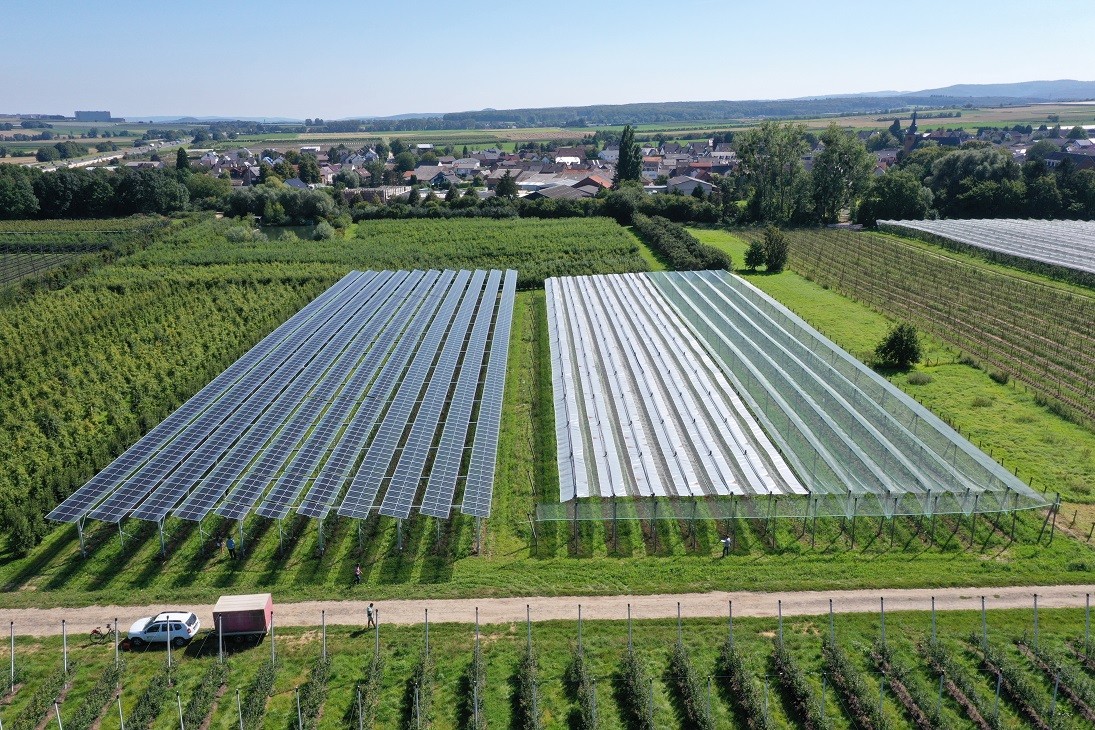German renewable energy company Baywa r.e. and the Fraunhofer Institute for Solar Energy Systems ISE have completed construction on a 258 kW agrivoltaic project located in Gelsdorf, in the state of Rhineland-Palatinate, Germany, in the frame of a five-year research project financed by the regional Ministry of Climate Protection, Environment, Energy and Mobility.
The Bio-Obsthof Nachtwey project occupies a surface of 9,100 square meters and covers a third of a plot of agricultural land devoted to crop cultivation for eight different apple varieties. Experts from the two entities explained that apples are currently being grown on the entire plot under four different crop protection systems: a foil roofing that blocks rain; hail protection nets that do not block rain; an agrivoltaic technology with permanent, light-permeable PV modules that blocks rain; and a tracking PV module tech that blocks rain only if necessary.
“Two different types of modules are used, with solar cells arranged either in strips or in a block pattern,” the Fraunhofer ISE said in a statement. “The aim is to determine to what extent the agrivoltaic systems protect the plants and fruit from harmful environmental influences such as hail, heavy rainfall, sunburn, frost or extreme temperatures.”
The electricity generated by the PV system is used for both upstream and downstream applications related to the production of apples, such as an electric tractor or an irrigation system, among others. The proposed system is also claimed to be suitable for the cultivation of pears, cherries, kiwis and other kinds of crops.
“Researchers will also investigate to what extent different approaches to light management, by way of different PV module configurations, influence plant growth and crop yields,” the Fraunhofer ISE further explained. “Other aspects of the system, relating to landscape aesthetics, economic viability, social compatibility, and plant cultivation parameters will also be examined.”
Baywa r.e. completed a 1.2 MWp array at Rini Kusters’ fruit farm in Wadenoijen, in the Netherlands in March. A first analysis of its performance showed the facility is able to reduce extreme high temperatures on the crop and also shield the plants from damp. The German company has also developed a special monocrystalline solar panel for agrivoltaic projects. These panels are able to absorb some of the incoming radiation and are set up in such a way that the air can pass through them. The natural airflow ensures that the atmosphere under the plants is cooler than ambient conditions, and much cooler than standard foil coverings.
The Fraunhofer ISE recently estimated the LCOE of agrivoltaic projects in Germany and found it currently ranges between €0.07 and €0.12 per kWh, for an average value of €0.093 per kWh.
This content is protected by copyright and may not be reused. If you want to cooperate with us and would like to reuse some of our content, please contact: editors@pv-magazine.com.




I have grape 🍇Farm in 8 acre.
Can it be helpful.
Would this work as garden shelter too, eg on a pergola? How about above windows?